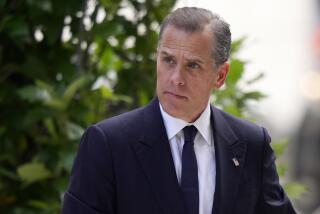‘Sins but no crimes,’ John Edwards’ defense says
- Share via
GREENSBORO, N.C. — A desperate politician willing to break federal laws to get elected president? Or a husband and father trying to protect himself and his family from humiliation from public disclosure of his extramarital affair?
Those were the starkly different portraits of John Edwards presented during opening arguments Monday, the first day of the former presidential candidate’s criminal trial on charges that he violated campaign finance laws.
Edwards is accused of accepting more than $900,000 from benefactors to pay for expenses of his mistress and hide the affair from his family — revelations that could have derailed his bid for the 2008 Democratic presidential nomination.
Andrew Young, the onetime trusted Edwards aide who is now the prosecution’s chief witness, began testimony Monday in a packed courtroom, talking about his close relationship with Edwards, his first suspicions of Edwards’ affair with Rielle Hunter, a campaign videographer, and his meetings with an elderly heiress who he said offered to do all she could to help elect Edwards president. Young is expected to be on the witness stand for much of Tuesday.
As the trial opened, U.S. District Court Judge Catherine C. Eagles ruled the defense team could mention in opening statements that Young recently called three other witnesses to ask about their testimony. But Eagles would not let them describe the contact to the jury as “witness tampering.”
Prosecutors are relying on Young — who just sold movie rights to “The Politician,” a tell-all book he wrote about his former boss — to make their case that Edwards was behind a scheme to use illegal political donations to cover up the affair to protect his run for the White House.
The defense, contending that payments made by two wealthy Edwards supporters were gifts, not campaign contributions, began laying the groundwork to try to discredit Young.
They portrayed Young as a self-promoter who saw Edwards as his “ticket to the top,” saying that he used money from an Edwards supporter to build a $1.5-million North Carolina house.
A jury will decide whether nearly $1 million paid by Edwards benefactors Rachel “Bunny” Mellon, a 101-year-old banking heiress from Virginia, and Fred Baron, a now-deceased Texas lawyer, to cover Hunter’s living and travel expenses were illegal campaign contributions or gifts to help a friend deal with a personal problem.
“If the affair went public, it would destroy any chance he had to be president, and he knew it,” Justice Department lawyer David V. Harbach II said in his opening statement. Edwards’ response to possible disclosure of the affair, he added, was “deny, deceit and manipulation.”
Harbach said Edwards pressed Young to seek money to hide the affair in order to protect his image as a family man and keep his campaign viable.
“Not only did Edwards know about it, but he directed it,” Harbach said. “He knew full well what he had done was against the law.”
Allison Van Laningham, one of Edwards’ defense lawyers, said that Edwards, who fathered a child with Hunter, had “committed sins but no crimes.” Edwards’ motive in trying to hide the affair was not to save his campaign but to protect his family from embarrassment, she said.
“It was that humiliation he was trying to avoid all along,” she said.
Van Laningham urged jurors repeatedly to “follow the money,” contending that a chunk of it leads to Young. Young is testifying under a “cooperation agreement” in hopes that he will not be prosecuted, Justice Department lawyers said.
Edwards, 58, played an active role during the final jury selection, conferring with his legal team and occasionally talking to his eldest daughter, Cate, who was with him in court. His parents sat behind him.
The former senator from North Carolina pleaded not guilty to six criminal counts related to campaign finance violations. If convicted of all charges, Edwards faces up to 30 years in prison and $1.5 million in fines.
More to Read
Sign up for Essential California
The most important California stories and recommendations in your inbox every morning.
You may occasionally receive promotional content from the Los Angeles Times.














